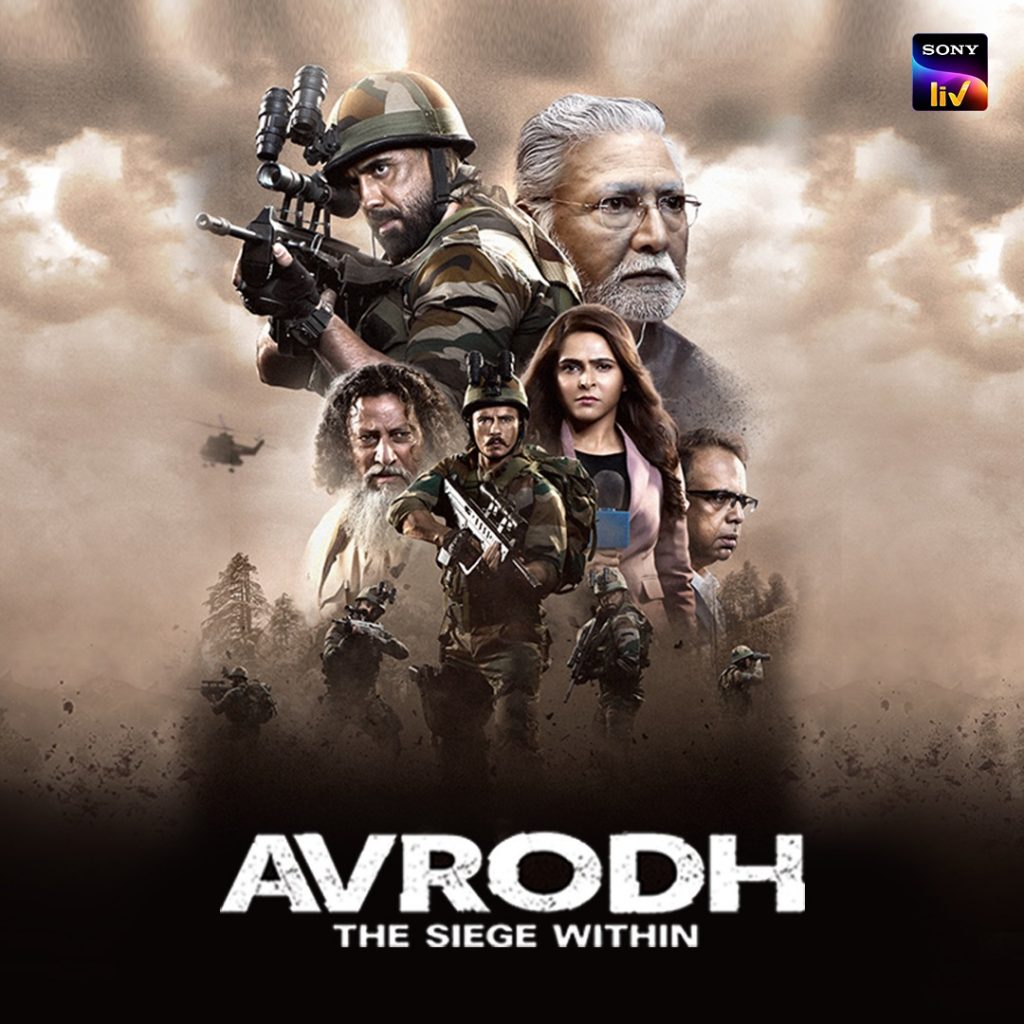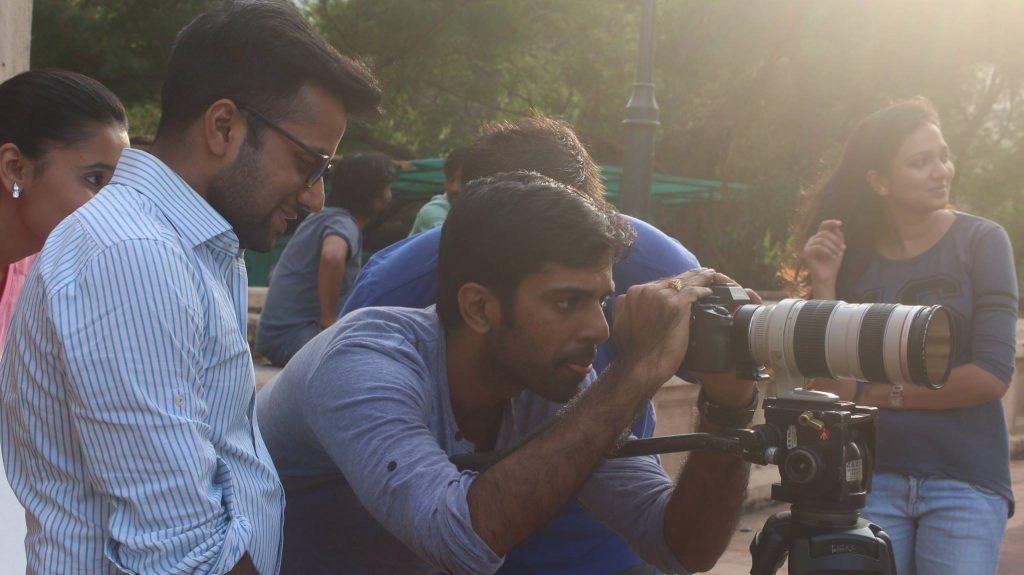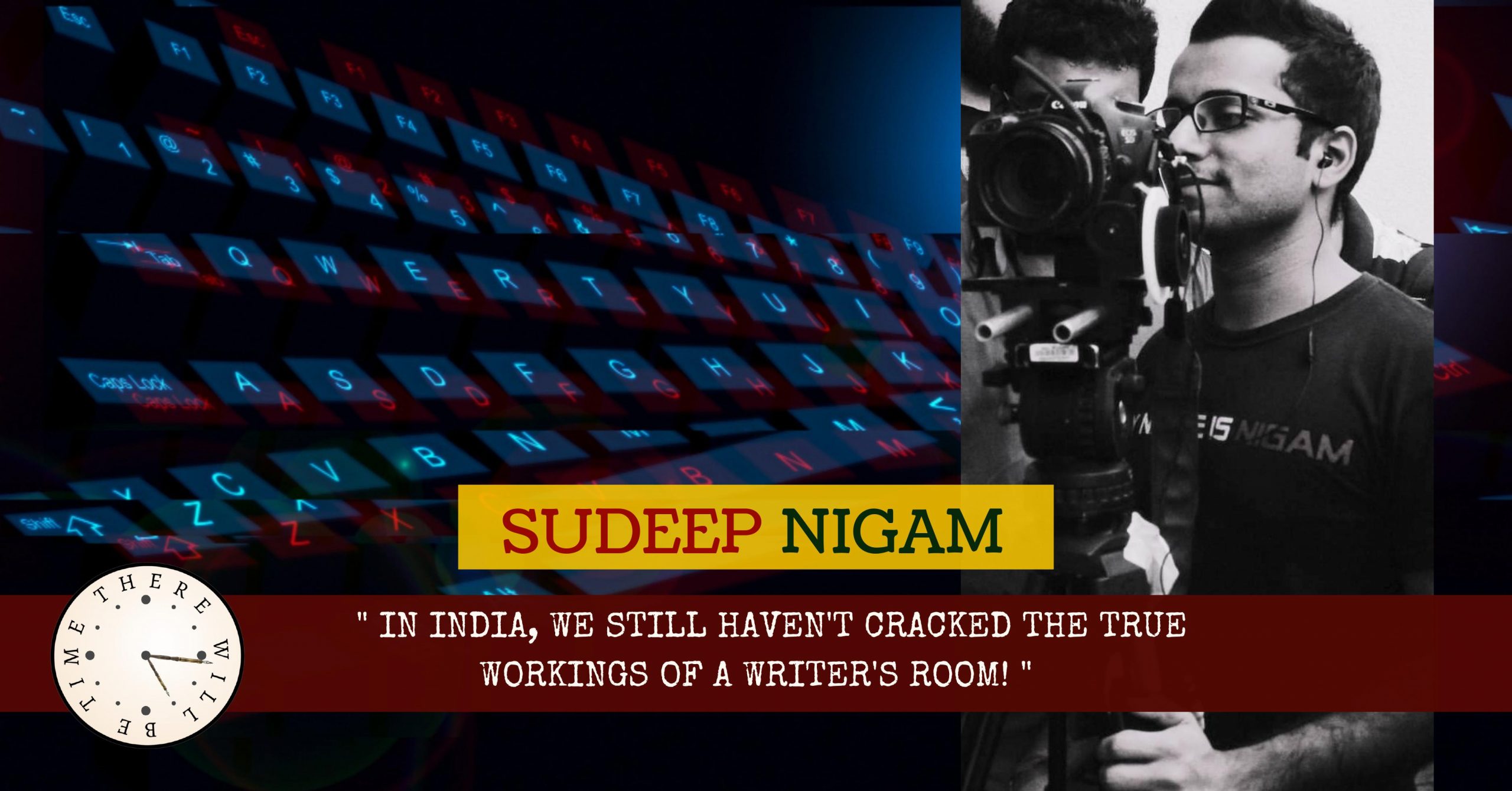” RESPECT YOUR WORK, SO THAT OTHERS RESPECT IT TOO…”
SUDEEP NIGAM

Q. What is it that attracted you towards screenplay writing – personally? Was it a conscious choice of vocation, or it happened to you?
No, it was definitely not a conscious choice of vocation, initially. I started writing when I was about 14, and clocking almost 2 decades from then, I am still at it.
In school, I had small opportunities to put together short skits for various events or annual functions, in which I used to act as well. I did a comedy adaptation of Julius Caesar, which was quite well appreciated. Simultaneously, I used to be a Master of Ceremony for events, game shows that were being held around. So my affair with the stage had started back then, both as an actor and a writer.
When I moved to pursue my graduation in the US, I got a chance to be involved with the university theater, apart from continuing to be a regular MC for many events of the Indian Diaspora. I was involved in most of the South Asian cultural activities that happened on campus, for all of 4 years I was in college. I even did an adaptation of the famous American film, The American Pie, re-imagining it with the characters from Mughal-e-Azam, the Hindi film. All this was fairly experimental, but it helped me build a passion for writing plays, and even performing them.
From the US, I moved to Dubai and started working in a London based firm. The opportunities to do stage plays or MC events began to dry up, and I got consumed by the workload of a corporate firm. To satisfy my urges, I took to blogging and even started contributing to a couple of leading cinema-related websites in India, remotely, as a regular columnist and reviewer.
Though, while in Dubai, I did get opportunities to get back on stage once in a while for private events, but they weren’t enough to sway my decision that I needed to change the course of my life. I was not entirely confident of my prospects as an actor, but definitely wanted to give writing a chance. The big question in front of me was to come back to India or go back to the US to pursue being a writer. I chose the former as I wanted to work in the Indian Film Industry, and felt that my expressions would connect better here.
Considering the spate of theater production companies in Bombay, or in most other cities, I was a little apprehensive of getting back into it. Additionally, the one thing that had significantly changed from my growing up years in school doing plays till this time – was that I had developed a deep affinity towards cinema, more than theater.
From the early years of my childhood, and till the stint in Dubai, I was an avid watcher of films, from around the world. I was the one who would go to the theater to see the best or even the worst of films, language no bar. Writing about films, studying them, their makers and their process had almost become my life, but I did realize that a lot of my knowledge would qualify as trivia, as opposed to technical expertise. I was desperate to dive into the entertainment industry, but I was an outsider with no such expertise. All I had was ideas, and stories that I wanted to tell.
When I came to Mumbai, I decided to enroll in a writing course for a year. For me, it was an excuse to buy time and test waters within the industry instead of jumping off a plane, unprepared. But the writing course turned out to be a turning point in my life. It taught me how little I knew about being a screenwriter.
Being a screenwriter requires a lot of craft, one that needs to be acquired and honed. Even after I graduated from the course, and till date, the process to learn the craft of writing is an ongoing one, because without the craft, the art does not find a medium to be expressed to the world.
And thus, screenwriting became my vocation, by choice, much later in my career than it should have originally, but it is something that I found the most satisfaction in.
Now, I feel I can do this all my life!
Q. How different it is to write for an OTT platform? In terms of process – do they always expect / promote a collaborative effort? What is the idea behind the ‘Writer’s Room’?
The response to this question keeps in focus the Indian entertainment industry, per say, and does not come from a global/Western outlook.
A couple of years after I had started off in Mumbai as a screenwriter is when a lot of people started making content for the web. No one had an idea about OTT platforms or their future, back then. But more and more fiction content was being written and shot to be put out on digital platforms. YouTube was huge at that time.
Incidentally, I got on this bus quite early. While most around me saw it as a passing wave, I saw it as an incoming high tide, or the one that could help me pay my bills, at least.
I was a fresh off the boat writer, and no one would take me to write a multi-crore film. But they would surely ask me to write out a short series that was being produced for a few lakh.
In less than a decade, we have been overwhelmed by digital content of all formats and purposes, but I feel lucky to have seen this development closely and been a part of it, in my own capacity, as well.
Writing for OTT platforms has successively evolved from where it started off and that too in a matter of a few years. In the beginning, everyone was just telling stories they wanted to tell, albeit in smaller budgets, and possibly in episodic formats or through short films.
Then, it became about telling stories that you cannot tell in films, mostly because of the nature of their content, or the runtime required to tell them.
Today, it is all that and a lot more.
I strongly feel that writing for OTT platforms requires a slightly different expertise from both Films and Television. With the falling attention spans of our audiences, and the availability of a million options of entertainment at their fingertips, the storytelling in OTT is hard-pressed to rise up to the occasion.
OTT content needs to engage on a different level with its audience, and within a shorter span of time. While you are unlikely to walk out of a theater after paying for a movie ticket, you are more likely to shut an episode of a series within the first minute itself, if you are not engaged with it.
While in films your writing is aimed at providing a wholesome feeling or an experience to the viewer at the end of its runtime, in OTT, the writing has to be designed to give a similar feeling in smaller portions of consumption, at regular intervals. Apart from the difference in the telling, you usually have a much longer runtime to justify, and thus, the story itself requires a lot more heft.
Coming to the second part of the question, the world of OTT does promote a collaborative effort in writing. This is to ensure multiple perspectives come into play to highlight the length and breadth of the story.
But it is not odd if one sees a series that has been helmed by a single person. True Detective (Season 1) is a prime example of this. But it is rather a rare example, simply because of the magnitude of the content that involves a lot of writing, a lot of dialogue, a lot of character development, and even more plot, mostly without the luxury of relaxed deadlines. Even for 10 episode seasons, the deadlines are so intense that at least 2-3 writers are required to focus on certain episodes or characters. This is where the concept of Writers Room comes in.
To be honest, in India, we still haven’t cracked the true workings of a Writers Room. Borrowing the model from the West, a writer’s room is supposed to have a pool of writers that work together on a concept to draw out the Story, Structure, Episodic Breakdowns, Episodic Screenplays and Dialogues. Usually, they are driven by a singular vision that comes from the Creator of the show, who becomes a part of this room.
It is of utmost importance for the success of the writer’s room that each individual writer is able to align himself with the vision that has been set forth for the show, the world of its characters and the treatment that is to be provided in the telling of it.
Most healthy writers’ rooms would provide enough scope for individual writers to bring in their perspectives about the show and find ways to incorporate them as well, but it becomes the job of the Creator or the Lead Writer to ensure that none of those perspectives begin to alter the very vision of the show.
In the Indian content space we have seen some examples of successful writers rooms with Sacred Games (Netflix), The Family Man and Paatal Lok (Amazon Prime Video), which were driven hard by singular visions and despite having writers that came from varied walks of life, were able to produce content that looked uniform in nature.
In the West, they have seen far more success with writers rooms with shows like House of Cards (Netflix) being written by more than 5-6 writers. In the event that an individual writer fails to re-wire his natural instincts of storytelling to align with the creator’s vision, he is likely to compromise the entire show itself. This is usually the case with a lot of writers’ rooms that are set up here in India, resulting in subpar content.
Q. Are there any special rules that you need to follow while formatting an OTT series episode script? Are those rules strict? What is the role of the agency + the end producer platform? Are they intrusive?
There are no special rules while formatting an OTT series episode script that are any different from the writing of films or any other form of content.
Each writer, whether for OTT or for Films, has his own process and style of telling the story which must adhere to the larger vision of the series.
Following the Western model, creators have come to become part-producers in the Indian content space as well.
If they are able to do it themselves, they put together a team to develop the show themselves. But if they cannot finance the development, they usually look for another Production House that is able to do so.
Excel Entertainment, Clean Slate Films, Red Chilies Entertainment, Applause Entertainment and many other production houses have successfully collaborated with creators and writers to develop shows, with or without an intervening agency.
The role of creative agencies has been fairly limited when it comes to the process of creating and developing a show. Only Tulsea Pictures, a Mumbai based agency for writers and filmmakers, has seen some success in putting together the development process of a couple of shows (Sacred Games, Leila) but it is the production houses, that can provide financial backing to the process of development, that are usually taking the lead during the initial phase of a show’s inception.
Ultimately, none of these production houses (except Viacom 18 and Balaji Telefilms) own or run an OTT platform of their own. And thus, comes in the process of pitching and green-lighting. Once they have sufficiently developed a piece of content, they approach the OTT platforms to pique their interest.
The OTT players (Amazon, Netflix, Hotstar) are the end platform where the series is supposed to stream and it is them who put in their money for its further development and production. Alternatively, an OTT platform can approach a Production House or a Creator themselves to develop content for them, as well, that is if they are looking for a particular vertical in their portfolio.
Considering there are multiple players involved in the production of a series that finally streams on a platform, the process is bound to be intrusive. More often than not, the platforms that put in their money decide the final form of content that is produced for them. The production houses, directors, creators, writers and everyone else does have a fair say in case of a conflict, but it is implausible that it results in an outcome that is unfavorable for the platform. After all, the hand that feeds the mouth cannot be severed.
On the contrary, in the case of Films, big ticket directors could have their word win over the word of the Producers as well, while the distributors of the film business barely have a say in the content being produced. In OTT, the distributor, that is the platform, definitely has the last word in most cases.
The only situation in which the OTT platform may not have a say is if they are acquiring content that has already been produced, for example Scam 1992, a recent series on Sony LIV that was acquired from Applause Entertainment.
Q. You have also written screenplays for theatrical releases? How is that different? Would you say that gives you more creative freedom??
While I have had no theatrical releases yet, I do have written screenplays for them. Though the process of writing a film may not be entirely different, it does require a different expertise to convey the story in a shorter runtime, as opposed to a series. In a series, you get the opportunity to tell multiple story tracks, through multiple characters, with an overarching thread that brings them together, while films are usually written with a singular plot, aided by subplots that only add to the central plot.
In simple words, a film more compact in its exposition, theme and structure, while a series has a more fluid structure, could have multiple themes and characters and much more detailing of the narrative. A few other differences I have already highlighted before.
I do not believe that films provide more, or less, creative freedom in terms of screenplay writing. The only difference is that when you are developing a film, there might be lesser talking heads in the room, than when you are developing a series.
One could experience a curbing of creative freedom while writing a series that has not originally been created by him, but it is something that a writer must adapt to, to follow the larger vision of the show and of the creator. Even if you are the creator of the show, you may feel that your freedom is being hijacked by a Producer or the OTT platform.
A similar situation might occur in the writing of films as well, especially when it is being written for a Director, a Producer or a Co-Writer who comes from a strong point of view.
Q. Any advice for youngsters who want to get into screenwriting – for OTT as well as the big screen? How should they prepare? Is there a ready market for them?
For the past 5 years, I have been teaching screenwriting to junior students of my alma mater, on a part-time basis, and this is a question that I am asked often. I honestly do not have a pointed answer to it yet.
Having said that, one cannot deny that the current time is one of the best for writers, new and old ones. There is enough content being produced across the board. Film and TV producers are jumping on to the bandwagon of OTT, while films continue to hit the theaters on a regular basis (except for the past 6 months when theaters shut down).
10 years ago, without OTT, there might have been fewer opportunities for writers, but with the advent of digital platforms, the writer and the creator has become the fore-runner to supply this increasing demand for content. There could be no better time to be hired for writers, and to also demand good paychecks for themselves.
But it is not as easy as it sounds.
Alongside the availability of work, there is also an increased availability of writers. While it is easy to get hired, it is equally easy to get replaced for the job.
With more people looking for fresher content, there is a higher chance of your work getting picked up, but it also runs a risk of getting lost in the barrage of things that come out. As such, being able to stand out in the crowd is necessary, as is the ability to align and adjust.
Today’s times require flexibility and adaptability from the writer, apart from creativity.
I have always believed that luck and hard work/perseverance have to work in tandem for one to make a mark in the film industry, but now I have come to believe that sincerity is an equally important asset.
No work is big or small, and no one project can make or break one’s entire career. Respect the work you do first, so that others respect it too.
If you go ahead with this thought, you will not be dissatisfied.
Success can come when it is destined to.






Very nice write up and interview. Well done Sudeep & best wishes for your future endeavours.
[…] has worked in a couple of films and OTT shows, and my access to him is through my dear friend Sudeep Nigam. Abhishek was part of the writing team that wrote Avarodh – the Siege Within. It was the quartet […]